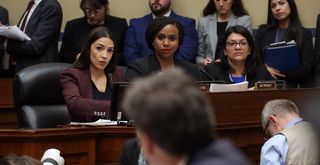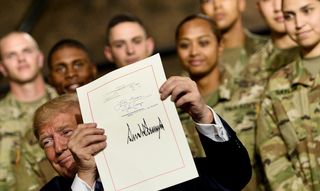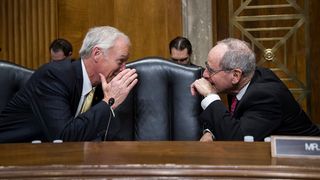Key takeaways
- Congress plays an important albeit underappreciated role in shaping US Asia policy.
- Over the next two years Congress will investigate a potential trade deal with China and, if it eventuates, a nuclear agreement with North Korea.
- There is widespread expectation in Washington that Congress may cut defence spending, delay appropriations for the Pentagon, or both.
- Congress will, on some issues, be a useful supporter of ‘status quo’ positions and robust US engagement and leadership in Asia.
Introduction
The US Congress plays an important albeit limited and context-dependent role shaping US foreign policy in Asia. During President Donald Trump’s first two years in office, the Republican-majority Congress appropriated two major increases in defence spending, kept the State Department’s budget stable amidst organisational uncertainty, and maintained a high tempo of Asia-specific foreign policy interventions that represented growing interest in the region among legislators. At the same time, Congress remains a bellwether for international concern about the ability of the US political system to provide the bureaucratic stability on foreign policy that is a precondition of robust engagement in the region.
Over the next two years, Congress will influence Asia-relevant issues of consequence for Australia, including China policy, diplomacy with North Korea, and the size of the defence budget. Congressional action will be shaped by new chairmen on the key Senate and House committees that oversee US foreign relations, armed services and trade. Republican-led Senate committees, under new leaders who are broadly supportive of Trump’s agenda, are likely to be less independent or influential than in the last Congress. However, Democrats’ majority in the House of Representatives will facilitate oversight of and investigations into Trump and heightened scrutiny of Asia policy. Congress’ role will be shaped by deep polarisation that will at times offer the Trump administration a relatively free hand. Conversely, there will also be selective bipartisan push-back when President Trump challenges long-held foreign policy positions.
Congress and Asia policy
Although the legislative branch has ceded much of its power on foreign policy to the executive in recent decades, the US Congress has significant levers at its disposal. These include the power of the purse, the ability to authorise the use of military force, vote on trade agreements, oversee administration and ambassadorial nominations and impose sanctions. Moreover, Congress can shape and retain the salience of issues through hearings, speeches and public comments by high-ranking members during major debates, in letters and statements sent to the executive branch, and via symbolic but significant initiatives that show where Congress supports or opposes administration policy.
Over the past two years, Congress has been particularly active on Asia policy. Perhaps most consequential was the bipartisan deal to appropriate two major increases in US defence spending, as well as twice ensuring the State Department budget remained stable despite the administration’s request to slash it by 30 per cent. Congress also passed the Better Utilisation of Investments Leading to Development Act (BUILD Act), which “double[s] America’s capacity to channel private investment into development-oriented projects in low and middle-income nations”. In doing so, it better enables the United States to marshal private capital for projects in Asia “with a dual developmental and strategic objective” of competing with China.1 The last Congress also appropriated funds for upgrades to air force bases in northern Australia, re-formed the Friends of Australia caucus that has led bipartisan push-back to President Trump, and confirmed Ambassador to Australia Arthur Culvahouse as one of its last acts in the lame duck period in early January.2
Over the next two years, the effectiveness of Congress on Asia policy will depend on whether lawmakers, with new personnel in key roles, will continue to prioritise Asia, conduct meaningful oversight of the administration’s foreign policy, and reach bipartisan agreement generally required to shape and constrain President Trump.
Other Asia-relevant legislation indicates a proactive Congress, but its impact at this stage is uncertain. For example, the most recent National Defense Authorization Act included language seeking to limit President Trump’s capacity to draw down the 28,500 American troops in South Korea below a floor of 22,000.3 Congress initiated and provided near-unanimous support for the Asia Reassurance Initiative Act (ARIA), which aims to bolster America’s presence in the Indo-Pacific region and enhance military and economic ties with friendly countries.4 Although the $1.5 billion per year has not yet been appropriated, its strong language on China’s regional behaviour, its support for Taiwan, and its bipartisan endorsement on Capitol Hill are all noteworthy. Additionally, Congress has enabled the return of the Balangiga bells to the Philippines (a contentious issue in the bilateral relationship),5 devoted resources to dioxin remediation in Vietnam,6 and funded the Palau Compact which helps support US military presence in the Western Pacific.7 However, these actions will likely add up to little unless seized upon by the Trump administration.8
Nonetheless, relative to previous congresses, this is a higher tempo of Asia-relevant action, and thus positive for Australia insofar as it helps support and encourage robust US engagement in the region. Over the next two years, the effectiveness of Congress on Asia policy will depend on whether lawmakers, with new personnel in key roles, will continue to prioritise Asia, conduct meaningful oversight of the administration’s foreign policy, and reach bipartisan agreement generally required to shape and constrain President Trump.
New personnel
In Washington, personnel is policy. The midterm elections heralded a wholesale turnover in chairs of the committees most important to Australia. Former Republican senators and committee chairs Bob Corker (Foreign Relations) and Orrin Hatch (Finance) retired at the midterms, while John McCain (Armed Services) passed away shortly beforehand. Their Republican replacements at this stage lack the same stature or preparedness to lead on international policy. However, this could change as the chairmen grow into the roles, and are encouraged by prominent senators like Mitt Romney, who are expected to criticise President Trump when he challenges long-held foreign policy positions. Democrats took the House at the midterms, and with it the chairman’s gavel on every committee and consequent power to conduct oversight and investigations.
Given that bipartisan legislation is increasingly hard to achieve, US allies like Australia often also seek progress on Capitol Hill by working with specific members who are not committee leaders but are nonetheless influential on foreign policy.
Most congressional interventions in national security issues emanate from congressional committees, especially the Armed Services and Foreign Relations committees. Committee chairs, in concert with the ranking member (the most senior representative on a committee from the minority party in that chamber) determine the agenda for the committee, oversee hearings on topics of their choice and schedule votes in committee that serve as a gatekeeper to legislation reaching the floor of the whole House or Senate. Committees are an important test of the political will of both Democrats and Republicans; co-operation between the chairman and ranking member is typically required to achieve bipartisan consensus on policy within committee, and a degree of bipartisanship in committee is usually necessary for a bill to pass the whole House or Senate. However, given that bipartisan legislation is increasingly hard to achieve, US allies like Australia often also seek progress on Capitol Hill by working with specific members who are not committee leaders but are nonetheless influential on foreign policy.9
The Senate
The Senate will be the more important chamber on foreign policy during the next two years, due to its members’ greater autonomy, its sole power to review executive branch appointments, and the fact that it has a Republican majority. Jim Risch’s election as the new Senate Foreign Relations Committee chairman has prompted concern among both Republicans and Democrats. A conservative Idahoan, Risch had a limited record of public commentary or intellectual engagement with foreign policy issues before taking the gavel. Asked this year how he would characterise his foreign policy philosophy within the panoply of views in the Republican Party — whether he was Jacksonian, Jeffersonian, nationalist, neoconservative or a conservative hawk — Risch replied: “I’m none of those. I’m a ‘Jim Rischian,’ whatever that is”.10 Upon his election as chairman in January, Risch issued a news release that reads more like a letter to Idahoans than a vision for US foreign policy.11 More recently, Risch has indicated that he sees China as the most important challenge for US foreign policy, and plans to hold more hearings on China’s geopolitical influence as well as empowering the Asia subcommittee.12 On North Korea, Risch has publicly supported President Trump’s diplomacy and criticised the media for what he views as insufficient recognition of the importance of the 2018 Singapore summit. A close ally of President Trump, Risch has explicitly disavowed publicly pushing back on the president like his predecessor Bob Corker, but he has nonetheless been critical of the White House on Saudi Arabia over the Khashoggi killing and war in Yemen.13 In addition to Risch, the committee includes several former Republican presidential hopefuls who are outspoken voices on foreign policy — including Mitt Romney, Ted Cruz, Marco Rubio and Lindsey Graham — who all boast a strong media profile and will at times provide assertive leadership or push-back against President Trump.
A close ally of President Trump, Jim Risch has explicitly disavowed publicly pushing back on the president like his predecessor Bob Corker, but he has nonetheless been critical of the White House on Saudi Arabia over the Khashoggi killing and war in Yemen.
On a brighter note, the Asia subcommittee held the most hearings of any Foreign Relations subcommittee last Congress, including a series that examined China’s challenge to the US-led liberal world order.14 Chairman Cory Gardner and Ranking Member Ed Markey will continue in their respective positions, have displayed a strong working relationship, led congressional debates on China and Asia policy, and sponsored ARIA. But both are up for re-election in 2020 and Gardner, a Republican, faces a tough race in increasingly blue Colorado. Consequently, we can expect the subcommittee’s bandwidth for Asia issues to diminish during the next two years as its leading senators spend more time fundraising, campaigning in their home states and prioritising issues that have greater salience for re-election.
The Senate Armed Services Committee has lost a giant in Senator John McCain. His replacement, Oklahoma’s Jim Inhofe, is a long-serving senator whose main priority will be to maintain high defence spending. Inhofe is a major supporter of Taiwan, has been publicly commenting on China’s rising military capability for decades and called for improved ballistic missile defence systems in response to North Korea’s growing capability. These positions will help channel attention towards Asia policy. However, Inhofe has ruled out trying to replicate Senator McCain’s foreign policy leadership as chairman: “We do have a Foreign Relations Committee and I have always said, I don’t always want to be in the driver’s seat doing all of our foreign relations.” Rather, Inhofe said, “my job is to make sure we have the resources to build the military to confront [the threats America faces]”.15 Consequently, the committee will focus on the size of the defence budget, improving readiness and modernising the force and nuclear triad. On these issues he will find support from outspoken Republican committee members like Tom Cotton, and often from Democratic counterpart Jack Reed. But Inhofe will regularly be at odds with Democrats in the House, particularly on issues such as the appropriate level of non-defence spending required to maintain high military spending, the cost of modernising the nuclear triad and the issue of transgender troops serving in the military.
The House of Representatives
New House Foreign Affairs Committee chair Eliot Engel is a pragmatic congressman known for working across the aisle, including with former chair Ed Royce. Staunchly pro-Israel, Engel will likely focus foremost on Middle East issues, as well as Latin America and the Caribbean. Relative to his depth of interest in those two regions of the world, Engel’s record of public commentary on Asia-relevant issues is comparatively limited and has tended to concentrate on human rights concerns in countries such as Burma. As chairman, Engel is highly unlikely to treat Asia policy as the foremost issue for his committee, unless North Korea returns as the most pressing foreign policy challenge for Washington. And, like other Democratic committee chairs in the House, he will doubtless use the committee for political gain, through investigations of President Trump and conduct of his diplomacy.16 Republican ranking member Michael McCaul was until last year the chair of the Homeland Security Committee and brought across a lot of his staff. Like Engel, the Middle East and counter-terrorism have been a focus in the past for McCaul.
A more significant change is Adam Smith taking the gavel of the House Armed Services Committee. Despite his position on armed services, Smith tends to be less hawkish on China than many of his fellow Democrats.
A more significant change is Adam Smith taking the gavel of the House Armed Services Committee. Despite his position on armed services, Smith tends to be less hawkish on China than many of his fellow Democrats. He has been relatively quiet on China’s island-building in the South China Sea, but vocal on cyber issues. Like his Republican Senate counterpart Jim Inhofe, Smith sees the primary role of the committee as overseeing and influencing the management of the Department of Defense rather than shaping regional policy. Smith has a good working relationship with his predecessor and now ranking member Mac Thornberry and respects the bipartisan nature of the committee. However, he has advanced a range of policy proposals at odds with the Trump administration and Senate counterpart Jim Inhofe. Smith believes that defence spending should be reduced and argued that the cost of recapitalising the nuclear triad — with its estimated price tag of US$1.2 trillion over the next 20 years — is strategically unnecessary and fiscally irresponsible.17 More broadly, given the trajectory of the national debt and other factors set to put downward pressure on defence spending, Smith is set to use his new perch to ask Pentagon leaders whether they are being ‘smart’ with money; and has explicitly disavowed the notion that the US military can be “utterly and completely dominant”.18 Finally, Smith has said he wants to increase oversight of US special operations missions and advance more inclusive policies for women and LGBTQ personnel in the military.19
Changing of the guard
Two important, cross-cutting personnel trends in Congress are the loss of senior Asia-focused leaders in the Senate, coupled with a rise in the number of young representatives with national security experience. The passing of Senator John McCain last year represented the end of an era of prominent, powerful Asia champions in Congress. In the 1990s and 2000s there were three towering figures: McCain and his long-serving colleagues Ted Stevens (R-Alaska) and Daniel Inouye (D-Hawaii), both of whom were first elected to the Senate in the 1960s and spent decades representing Pacific-facing states hosting major military facilities. A range of relatively junior senators like Dan Sullivan, Cory Gardner, Joni Ernst, Marco Rubio, Ed Markey and Chris Coons have shown considerable interest in national security and Asia issues, but their influence pales in comparison with recent giants of the Senate on foreign policy and Asia. For an Australia that wants an Asia-focused United States, the loss of McCain is significant insofar as it represents a diminution of the framing power of Congress to reassure allies and lead Senate debates.

However, the midterms resulted in a notable increase in the number of young, outspoken, representatives with experience in the national security community. The freshmen class of representatives includes Tom Malinowski (former Assistant Secretary of State), Abigail Spanberger (CIA), Elissa Slotkin (Pentagon official), Andy Kim (National Security Council staffer) and veteran Dan Crenshaw, who has already developed a significant public profile. They have joined a range of young representatives with national security experience, including Mike Gallagher, Adam Kinzinger, Elise Stefanik, Jimmy Panetta and Stephanie Murphy. These members are much more familiar with foreign policy issues than most of their counterparts and will therefore look to play an active role in Congress and the media to build their profile and shape policy debate. However, their impact on and attention to national security issues will be limited by the fact that they are relatively junior and, more importantly, will focus primarily on the domestic issues most critical to their 2020 re-election campaigns.
Polarisation, oversight and bipartisanship
Congress’ ability to meaningfully influence Asia policy over the next two years will depend on where the needle falls between polarisation and bipartisanship. In some ways, this Congress will likely be extremely polarised, a factor that has been worsening since Newt Gingrich took the speaker’s gavel in 1995. Moreover, just as Republicans used their House majority during President Obama’s last six years in office to investigate the Executive Branch, the new Democratic Congress will spend extensive time and attention investigating President Trump.20 However, when President Trump challenges long-held US foreign policy positions, it has resulted in stunning bipartisan push-back. Congress has delivered these rebukes on Trump’s relations with Russia and Saudi Arabia, a pattern that will likely continue in key areas. The closer Trump gets to authoritarian regimes and the more he undermines US alliances, the larger role Congress will play in support of ‘status quo’ policy positions.
Two exaggerated possibilities for this Congress illustrate the range of potential outcomes. At one end of the spectrum, deep mistrust between Republicans and Democrats may render Congress increasingly challenged in performing its most basic functions, such as keeping the government open and appropriating funds for federal agencies on time. As House Democrats use several committees to investigate the administration, Republicans will likely rally behind President Trump as the 2020 election campaign continues to gather momentum. On foreign policy, this highly polarised Congress is likely to focus attention on issues with the greatest domestic political relevance, including Russia and the Middle East. This will divert attention from Asia. At the other end of the spectrum, Congress could play a very active role in shaping and limiting the president’s authority on several pressing issues, such as entering into a new trade agreement with China or making substantive changes on North Korea policy, adopting its playbook on Russia and Saudi Arabia from the past two years.
The most likely outcome is a messy, confusing and issue-dependent mix of these dynamics. Democrats will use their control of the House to investigate President Trump and conduct oversight of his foreign policy. Meanwhile, on a wide range of issues, Republican members will likely support a president whose popularity will be a key determinant of their re-election prospects in 2020. On issues where Congress is split along party lines, such as climate change or the Iran nuclear deal, Congress will play a limited role. When Republicans support President Trump’s position, despite opposition from Democrats, President Trump will have a relatively free hand in managing foreign policy. Indeed, Senate Majority Leader Mitch McConnell has already been loath to allow his members to limit Trump’s power, as demonstrated by his decision last year to block a Republican-led amendment to the National Defense Authorization Act that would have required congressional approval for the president to impose tariffs on national security grounds.21 But Republicans will break with the president in some of the cases where he undermines long-held tenets of US foreign policy, admires autocrats, admonishes allies and ignores intelligence. When there is bipartisan push-back, it serves to shape and constrain President Trump’s freedom of action, either through legislation (Russia sanctions) or overwhelming media criticism (following the Trump-Turnbull phone call). Moreover, given President Trump’s penchant for significant policy changes, both Democrats and internationally-minded Republican senators will use committee hearings to conduct intense oversight of senior administration appointees who execute foreign policy.

The expected behaviour of the Intelligence Committees may be a microcosm of the complex, chamber-dependent and cross-cutting dynamics at play on Capitol Hill. Under the leadership of Adam Schiff, the highly partisan House Intelligence Committee will focus almost exclusively on investigating the Trump administration’s ties to Russia, especially after the release of the Mueller report. Yet the relatively bipartisan Senate Intelligence Committee will often act as a check on a president who regularly undermines senior intelligence figures. The open question with the intelligence committees, which is broadly relevant for issues concerning Congress and Asia policy, is whether and when bipartisan agreement can be found across party and chamber lines. That is a high bar, and when it is cleared, it will have a major impact on the Trump administration. But in many cases, there will merely be a lot of noise but no consensus on Capitol Hill, which will cede power to an administration with a maximalist vision of executive power in foreign affairs.
The outlook
Congress is set to play a key role on China policy, North Korea and in determining the size of the US defence budget. Broad bipartisan support in Congress for the Trump administration’s tougher approach to China — but not necessarily his methods such as tariffs — will empower the administration. Expect plenty more scrutiny of China’s global activities in Congress, whether on military issues, cyber, human rights or influence operations. On North Korea, there is still widespread concern about President Trump’s capacity to make major concessions to Kim Jong-Un without achieving verifiable benefits. Eliot Engel’s foreign affairs committee is likely to engage in targeted oversight of any proposed agreement between the United States and North Korea. However, the breakdown of talks during the second summit suggests there may be no concessions to consider for some time.
Finally, expect robust debates about the size of the defence budget. House Democrats are likely to use their leverage to push for lower defence spending, which has also been favoured by many Democratic presidential hopefuls.22 There is widespread expectation in Washington that defence spending will either be lower than last year’s US$716 billion, appropriated late, or both, with a deleterious consequent impact on national security.
From Australia’s perspective, Congress will on some issues be a useful supporter of ‘status quo’ positions and robust US engagement and leadership in Asia. On many others, Congress will be slow-moving, infuriating or downright depressing in its impact on Asia policy. The dynamics in Congress may be confusing and contradictory, but they will be consequential.






